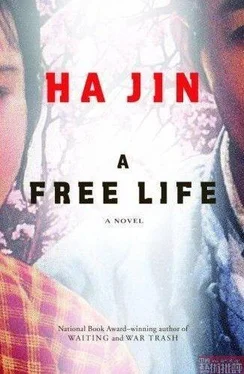Nan saw his wife and son fade away into the woods. He was glad that for the rest of the summer they could use this house for themselves, but at the same time his mind was restless, teeming with worrisome thoughts. So many things had happened recently that he was still in a daze. Six weeks earlier, when the field armies were poised to attack the demonstrators in Beijing, some Chinese graduate students at Brandeis University, where Nan had been working toward a Ph.D. in political science, had discussed all the possible means of preventing the violence from being unleashed. They talked for hours on end, but were mainly blowing off steam. Then, without thinking twice, Nan tossed out the idea that they might seize some of the top officials' children studying in the Boston area, especially those at MIT, and demand that their fathers revoke martial law and withdraw the troops from the capital. He was prompted by anger, just having seen on TV soldiers beating civilians with belts, clubs, and steel helmets, many faces smashed, bathed in blood and tears. To his surprise, his fellow compatriots took his suggestion so seriously that they began planning a kidnap. But before they could seize any hostages, the massacre broke out in Beijing and it was too late to do anything. Instead they went to Washington to demonstrate in front of the Chinese embassy. Nan joined them and stood shouting slogans before that ugly brick building, in which the officials and staff hid themselves and wouldn't show their faces but would give the demonstrators either the finger or the victory sign through the window curtains.
Back from D.C., he was shocked by another incident. Hansong, a visiting scholar in East Asian Studies at Harvard, whom Nan had known quite well and who had been actively involved in the aborted kidnap plot, had kept a pistol that he was supposed to return to the gun dealer. Rumor had it that his girlfriend had disappeared in Tiananmen Square and that she must have been killed by the army and buried somewhere in a mass grave. Crazed, Hansong ran out one night and had a row with a homeless man in a park in Watertown. He pulled out his revolver and shot the old man in the head. Nan was so shaken by the killing and by his own involvement in the unexecuted kidnapping that he declared to Pingping that he would never participate in any political activities again. He also decided to give up his graduate work in political science, which he had never liked but which he had been assigned to study when he was admitted to college back in China. Later, he hadn't had any choice but to stay within the same field when he went on to earn a master's degree. Now he felt too sick of it to continue studying it.
He had decided to quit graduate school, but he had no idea what he was going to do. It was said that the U.S. government would take measures to protect the Chinese students and scholars who didn't return to their homeland, so he should be able to stay here legally, but what unnerved him was that from now on he couldn't rely on the university for financial aid anymore. Such an independent condition was new to him. Back in China he had always been a member of a work unit that provided a salary, shelter (usually a bed or at most a room), coupons for cloth and grain and cooking oil, medical care, and sometimes even free condoms. As long as he didn't cause trouble for the authorities, his livelihood was secure. Now he would have to earn a living by himself and also support his family. He was free, free to choose his own way and to make something of himself. But what were the choices available for him? Could he survive in this land? The feeling of uncertainty overwhelmed him.
A week ago, Hansong, the deranged man, had been committed to a mental hospital. Nan hadn't gone to see him, but his friend Dan-ning, who had opposed the kidnap idea from the very beginning, had visited Hansong at the asylum and left him with a tin of jasmine tea, which made Nan wonder if an inmate in there could have free access to hot water. Danning had told Nan that Hansong grinned at him without any trace of remorse. "He's a real psychopath now. His loony smile spooked me and made my scalp crawl," Danning said.
How fortunate it was that Hansong's mental state had prevented him from talking; otherwise he might have revealed their plan for the kidnap. Then every one of them would have been dragged to court.
Pingping and Taotao returned with just one fat yellow mushroom, the kind called Slippery Jack. There had been a drought, and most fungi in the woods had vanished. Nan noticed that since they'd flown back from San Francisco, his son hadn't even once mentioned returning to China. Taotao seemed to be adapting quickly. Although unable to read a word of English yet, the boy was fascinated by an old set of Britannica, which his parents had bought at a church bazaar. He looked at the pictures in some volumes and raised all kinds of questions. He was eager to test his father and even asked him which planet was bigger-Mercury or Saturn? Nan couldn't give a definite answer and just guessed, "Mercury."
"Wrong!" the boy announced, beaming. He seized every opportunity to make fun of his dad. One of his favorite tricks was to tie a long chain of rubber bands to Nan 's toe so that the whole thing would hit his sole when released from the other end. Nan was pleased by his son's little pranks, which he felt indicated that the child had accepted him as his dad.
Even though the Wus had the entire house to themselves, they confined themselves to the attic except when they had to use the kitchen downstairs. In their spacious room upstairs stood a large bed, Nan 's desk, a coffee table under the window facing the northern yard. Two of the walls were lined with books, most of which were the Masefields'. Nan had the habit of reading late at night, so he and his wife slept separately most of the time. Since their child shared the bed with Pingping now, Nan was left alone. He used the other room in the attic. It was smaller but fully furnished, with a pair of single beds and a redwood nightstand in between. This room had occasionally served as a guest room for the Masefields.
Before going to sleep, Nan opened a volume of Robert Frost's poems and began to read. He loved Frost, Auden, Whitman, Li Po, and Tu Fu, but sometimes he couldn't fully understand the poetry written in English. Tonight his eyes were heavy, and from time to time the words blurred into a solid block and then faded from the page. Before he could finish the long poem "The Death of the Hired Man," the book slid from his hand and plopped on the carpet. Without noticing it, he fell asleep, snoring lightly while the porcelain lamp still glowed on the nightstand.
The next day the Wus went to the mall in Watertown to buy toys for Taotao. The boy wasn't interested in cars, or guns, or bicycles, or stuffed animals. He wanted a large telescope so that he could watch the stars. His parents bought it for him for $105. The moment they came back, Taotao opened the long carton and began assembling the telescope. He couldn't read the instructions but wouldn't let his father help. Whenever Nan picked up a knob or screw, the boy would yell, "Put that down!" Somehow he managed to join the pieces together without a glitch, as if he had owned such a thing before. He wouldn't go down to eat dinner until he set the tube on the tripod.
Unfortunately it was an overcast night, so his parents wouldn't go out with him to stargaze. This upset him. After dinner, he was told to go upstairs and clear away the paper and the plastic bags, putting them in the trash can in the bathroom, and then come down again to look at a picture book together with his mother. Pingping had checked some childrens' books out of the town library to prepare herself for teaching him how to read English.
As she and Nan were talking about how to register him at the elementary school, suddenly something thudded on the stairs, followed by footsteps and a clack. "Taotao," Pingping called out, "are you all right?"
Читать дальше












